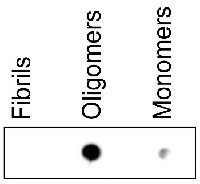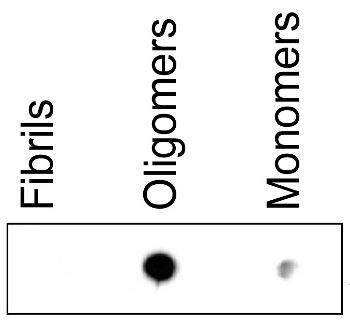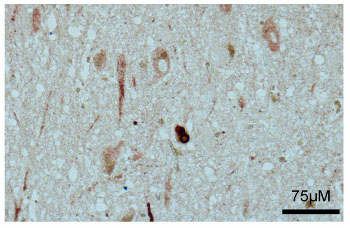1

Anti-ASyO2 | Mouse anti-human alpha-synuclein | oligomer-specific (clone number 51,24)
AS13 2717 | Clonality: monoclonal | Host: Mouse | Reactivity: Human
- Product Info
-
Sub class: IgG1 Immunogen: Synthetic peptide derived from human alpha-synuclein Glu131-Ala140 Host: Mouse Clonality: Monoclonal Purity: Immunogen affinity purified serum in PBS pH 7.4. Format: Lyophilized Quantity: 50 µg Reconstitution: For reconstitution add 50 µl of sterile water Storage: For short time storage please add sodium azide and srote at +4°C.For long time storage store lyophilized/reconstituted at -20°C; once reconstituted make aliquots to avoid repeated freeze-thaw cycles. Please remember to spin the tubes briefly prior to opening them to avoid any losses that might occur from material adhering to the cap or sides of the tube. Tested applications: Dot blot (Dot), ELISA (ELISA), Immunolocalization (IL) Recommended dilution: 1-2 µg/ml (Dot), 2-4 µg/ml (ELISA capture), 10 µg/ml (IHC) Expected | apparent MW: 14 kDa
- Reactivity
-
Confirmed reactivity: Human Predicted reactivity: Mouse Not reactive in: No confirmed exceptions from predicted reactivity are currently known - Application Examples
-
dot blot
Dot blot reaction of the binding capacity of ASyO2 to fibrils, monomers and oligomers. Equal amounts of each sample were spotted on a nitrocellulose membrane and then dried. The membrane was blocked with 5% non-fat milk before incubated for 1 h with anti-ASyO2 (25nM) and then with secondary antibody, anti-mouse HRP-conjugated (1:1500). The membrane was washed with PBS containing 0.25% Tween-20 before detection using ECL prime (GE Healthcare).
immunolocalization
Tissue sections from the human PD midbrain, substantia nigra, were de-waxed and rehydrated in ethanol and then incubated with ASyO2 at RT for 1h. The immunoreactivity was detected with the anti-mouse Peroxidase Reagent Kit (ImmPRESS, Vector Laboratories, Inc.) and then developed using the ImmPACT AEC Peroxidase Substrate kit (Vector Laboratories, Inc.).
- Background
-
Background: Alpha-synuclein is normally an unstructured soluble protein that can aggregate to form insoluble fibrils in pathological conditions characterized by Lewy bodies, such as Parkinson's disease, dementia with Lewy-bodies, and multiple system atrophy. In analogy to many other amyloid associated disorders, alpha-synuclein may also form oligomeric assemblies. These small and soluble forms have been suggested to exert a stronger tissue damaging effect as compared to the monomeric and fibrillar counterpart. Using a recently developed technique a monoclonal oligomer-specific antibody has been designed.
- Product Citations
-
Selected references: Giarola et al. (2024). An α-helical peptide-based plasmonic biosensor for highly specific detection of α-synuclein toxic oligomers. Anal Chim Acta. 2024 May 22:1304:342559. doi: 10.1016/j.aca.2024.342559.
Brännström et al. (2014). A Generic Method for Design of Oligomer-Specific Antibodies. PLoS ONE. DOI: 10.1371/journal.pone.0090857. - Protocols
-
- Reviews:
-
This product doesn't have any reviews.

